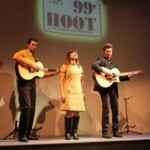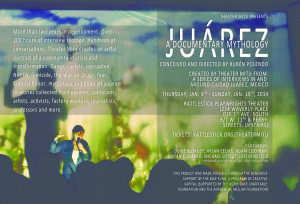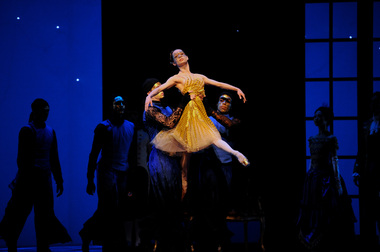Review by Carol Rocamora
“Ain’t no use to sit and wonder why, babe…Don’t think twice, it’s all right,” sang Bob Dylan on his way to stardom.
But folksinger Paul Clayton did wonder why – and thanks to playwright Larry Mollin, he’s come back from the grave to challenge Dylan for having stolen his song (among others of their contemporaries).
Search: Paul Clayton is Mollin’s moving, myth-shattering new musical about a friendship between the long-forgotten title character and the legendary Bob Dylan. Clayton was a talented young singer, composer, and folkloric scholar who gained prominence in the 1950s and 1960s. They met in 1961 at the Gaslight in Greenwich Village, center of the folk song scene. Clayton, at 30, was already established, having played with Dave Van Ronk and other folk luminaries. Dylan, a mere 20, was a nobody, a brash young newcomer, bursting with talent and unbridled ambition.
The two hung out together in the early 1960s, deeply immersed in folk music and pot. For Clayton, it was love at first sight. Dylan’s unique style — the corduroy cap, the tousled hair, the slight lisp, the elfin grin — captivated him.
For Dylan, on the other hand, it was an opportunity to climb. Clayton wanted to make music and love; Dylan wanted to make connections and a career. While crashing on Clayton’s couch, Dylan ingratiated himself into Clayton’s circle of musicians, managers, and agents. According to Clayton, Dylan used everyone along the way, while developing his own musical persona. Part of that process included taking songs from Clayton and others and making them Dylan’s own. “Steal a little and they call you a thief,” says Mollin’s Dylan. “Steal a lot, and they call you a king.” Dylan’s rise to stardom was meteoric, while Clayton dove into a downhill spiral of drugs and depression. Once Dylan had enough clout and cash, he dumped Clayton and moved on.
The play dramatizes events between 1961 and 1965, including their cross-country tour (which Dylan abandoned halfway), the 1963 folk-song festival in Washington Square (at which many singers were arrested), and the New York blackout in 1965.
But the star of the show is the music. Employing a talented cast of six playing multiple roles and instruments (including guitar, banjo, and Dylan’s signature harmonica, of course), this spirited production fills the tiny Triad Theatre with a rousing medley of folk songs of the ’60s, including “This Land Is Your Land,” “Gotta Travel On,” “Who’s Gonna Buy You Ribbons (When I’m Gone),” and of course “Don’t Think Twice” (Dylan changed the title when he claimed Clayton’s song for his). Jared Weiss’s leprechaun-like Dylan is a charmer, and Jaime Babbitt, Ereni Sevasti, Michael Lanning, and Allan Harris bring multiple roles to life with their powerhouse voices. Still, it’s Clayton’s show, and Peter Oyloe’s soulful singing and poignant performance capture our hearts.
Under Randal Myler’s direction, Mollin’s play lovingly evokes the soaring spirit of the ’60s, when the folk songs of Pete Seeger, Woody Guthrie, Joan Baez, and Peter, Paul & Mary (all mentioned) lifted our hopes despite turbulent times. Bob Dylan emerges as the folk hero, standing on the shoulders of the others. “Folksinging is plagiarism,” Clayton reflects, ruefully. “If you can’t write, rewrite. If you can’t rewrite, copyright. If you can’t copyright, sue.”
As Clayton points out, Dylan was a shrewd strategist, and once the Beatles came on the scene, Dylan predicted that rock’n’roll would be the next big thing. Dylan moved on to the electric guitar and broke Clayton’s heart all over again.
While Bob Dylan remains the era’s iconic figure, Paul Clayton, who died tragically in 1967, remains in obscurity. Hence the title Search: Paul Clayton. The play begins and ends with a computer-screen Google search for the folksinger’s name, projected on the upstage screen. But once you hear the gifted Peter Oyloe tell his story and perform his songs, you won’t have to Google Paul Clayton’s name again.
Search: Paul Clayton, by Larry Mollin, at the Triad Theatre, 158 West 72nd Street, New York, through May 21

























